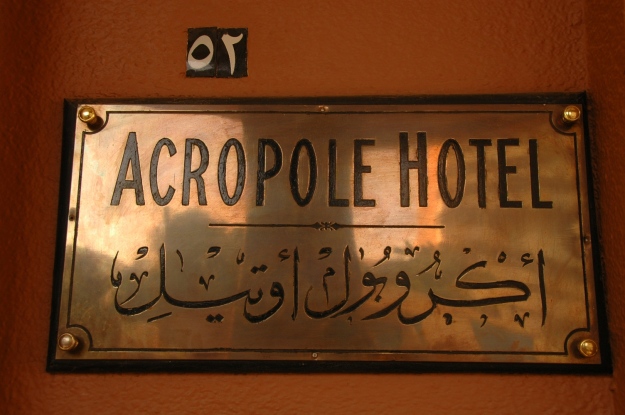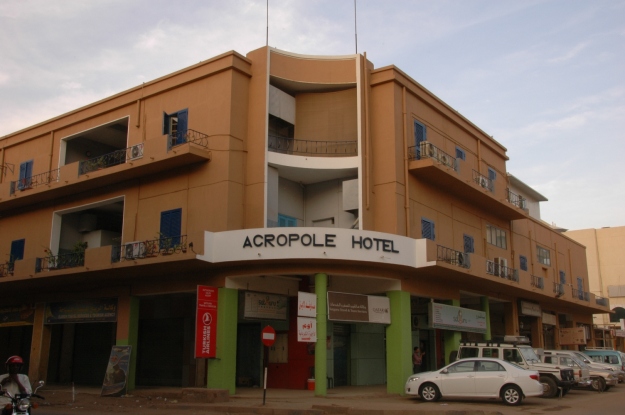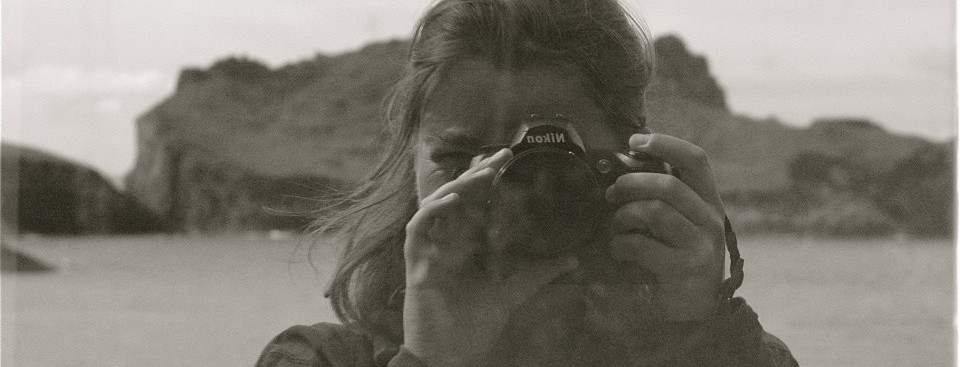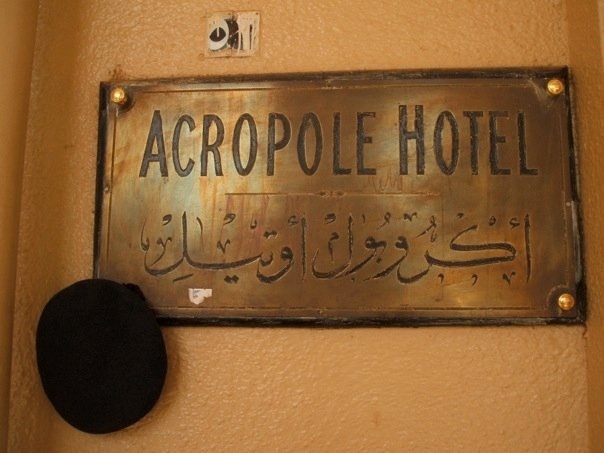 The brass sign of the Acropole Hotel
The brass sign of the Acropole Hotel
After a restful 3 and a half hours sleep I awoke to a phone bleating in my ear. It was George.
George Pagoulatos is the owner of the Acropole Hotel, the oldest hotel in Khartoum. George runs the hotel along with his 2 brothers, Thanasis and Mike, and now George’s nephew, Pav Los. George is Sudanese by birth but of Greek descent and his father, Panaghis, founded the hotel in 1952 after having left his poverty striken homeland of Greece in the last years of World War Two. The hotel started with just 10 rooms and all the furnishings were brought from their own home. Ambitious in the face of adversity, George’s father expanded the hotel and the family businesses while his mother held the family together. In 1970, disaster struck as President Nimieri nationalised Sudanese industry and foreign business abandoned the country and so taking with it, the clientele of the Acropole. The Pagoulatos family stayed. By 1973, the country was facing bankruptcy and the President was soon begging foreigners to invest once more. The lean years were over and the Acropole once more thrived with the return of guests.
After the death of their father the brothers took up the mantle of the running of the hotel. By then it was a 50 roomed establishment with its own liquor store and confectionary shop. It served foreigners with a wide range of professions: journalists, aid organisations, NGOs and even spies according to a friend of the journalist Edward Girardet. The hotel had a roof top terrace where they held regular film screenings and George’s mother, despite her frailty, still organised the running of the kitchen and laundry.
In 1983 Islamic Law was imposed and the liquor store was closed. The Acropole ceased to be the distribution centre of Amstel Beer in Sudan and their prosperity was reliant on the success of the hotel. Success came, in the form of a rush of guests to The Acropole; relief workers and journalists tied up with helping and reporting on the drought in Ethiopia and Sudan flocked to Khartoum. The Pagoulatos family were suddenly caught up in the middle of a human disaster and they responded as only they knew how: not only helping their guests but helping the entire relief organisation and distribution of aid to their famine striken country. George and his brothers have evidently inherited the courageous and adventurous nature of their parents. Bob Geldof visited Sudan in the early 1980’s and the Pagoulatos family were there to help. Behind his desk in the hotel office, George has a framed personal note from Geldof humouring the owner as to the future success of the hotel.
 George, as ever on the phone organising the next ‘rescue’ mission. The letter from Bob Geldof can be seen just above his left shoulder.
George, as ever on the phone organising the next ‘rescue’ mission. The letter from Bob Geldof can be seen just above his left shoulder.In 1988 the hotel was targeted by a terrorist attack and Thanasis, the oldest of the brothers, remembers seeing a man run into the hotel and then dash out again. Naturally, Thanasis went to see if the man was ok and at that moment a bomb went off destroying the hotel, killing 7 people and injuring many others. Thanasis has difficulty hearing after the bomb blast but he and his brothers survived. And drawing on their ambition and sheer determination the brothers set up The Acropole Hotel in new premises across the street.
 The new premises of the Acropole Hotel
The new premises of the Acropole HotelAnd that is where they are to be found today. Behind an inconspicuous doorway and up a staircase, you enter into a haven that is The Acropole. But as an archaeologist travelling to Sudan for the first time in 2008, I felt like I had met George before I had even got to the hotel. I was bringing geophysical survey equipment into the country. A smart black box containing a piece of kit that by virtue of its unfamiliarity with most people looks incredibly suspicious. And in Khartoum airport amidst the simple luggage of others it stood out as looking highly suspicious. But George had sent a contact of his. He scooped us up and started the gentle process of negotiation; oiling the way for me to fill in the gaps with what it was, what it did and why on earth a woman would be travelling with such a odd suitcase. George’s man was cool, and unflappable. It made you feel the same. He had the effect of making you feel safe and reassured which at 4am in a foreign land with unknown protocols was just about the best feeling you could have. George’s reach to make you feel protected had stretched beyond the walls of his hotel. It took time to let us pass, but pass we did and with our kit in tow which was not everyone’s experience. Numerous archaeological missions had had equipment impounded for days. Not us, we were soon all packed into a car and on our way.
On arrival at The Acropole a tall, impeccably presented man with a silver tinge to his hair glided into view. George. To be in his company is to feel like a wave of calm washing over you. He beamed a huge smile and welcomed us. He showed us to our rooms and told us to sleep until whenever we wanted. There was a peace and tranquility to his words that just felt soporific. It worked. We awoke late the next morning and even though breakfast was long finished, George prepared a table on the terrace and slowly a series of turbaned staff began shuffling past delivering us a four course breakfast with strong coffee. The bustle of the street below us seemingly worlds away.
Then George springs into action. Registration, travel permits, photography permits, travel plans, changing money… All need to be done and suddenly George turns into an efficient machine. This is a far cry from the gentle man that met us the night before but this transition is what he is legendary for. You don’t organise the relief work to save your country by simply having a big smile, a nice demeanour and a calm nature. This effiency, determination, and organisational skill are what accomplishes that.
Returning from the desert, The Acropole is a paradise of home comforts and George resumes his gliding calmness to welcome you back. He figuratively dusts you down from your adventures and allows you to stop thinking and relax. I was flaked out on one of the sofas in the lobby of the hotel when George swooped in with a tray and handed me a chocolate ice-cream. How did he know that to tuck into a rich, cold, sweet chocolate dessert was the most perfect thing that could have happened at that precise moment? His experience and understanding is immaculate.
But his capacity to make you feel like you are cushioned in a comforting world that cannot be touched is not his only strength. Where he thrives is dealing with challenges. To him a challenge is “fun” and in essence is what keeps him going.
I think the following quote from Wikipedia succinctly sums up what I getting at:
“When notorious filmmaker Leni Riefenstahl’s helicopter crashed in the Nuba mountains, the Pagoulatos brothers found her a Sudan Airways captain and plane to rescue her and the crew, and had an ambulance waiting at the airport.”
Need I say more? Probably not. But I will.
George and his brothers have done so many personal favours to so many that I am sure everyone leaves The Acropole feeling as if they have had special treatment. And they would be right in thinking that. We may not all need rescuing from a plane crash but in each individual case, the Pagoulatos family will have made their guests feel like they have been saved in whatever way was personal to them.
My experience of being saved by George came only once I had returned to Rome after a two week season of archaeological survey work on Sai Island in the north of Sudan. As I waited for the luggage to come through at Fiumicino airport, our bags arrived but not our equipment. A trip to outsized luggage offered no reward and suddenly the onset of panic filtered through my system. First stop was the airline help desk where, unable to pick a photo matching the description of the lost box from a series of identikit images of regular suitcases, I had the sensation this was a lost cause. That, and the fact the member of staff “helping” me was more intent on the conversation she was having with a friend on her mobile than she was me, who was clearly in the early stages of blind panic.
I was given a number to phone and they would find the case. Two days of phoning and no sleep through worry and anxiety and more importantly no success by the airline to retrieve the case, there was only one person who could possibly help me. A hotel owner in Khartoum.
I phoned George and just hearing his voice reassured me something would be done. Quite unlike any sensation I had had in Rome airport. He called back a few hours later. He had personally gone to Khartoum airport and used his charm and basically magic powers and had located my case which was still sitting in a hanger at the airport. He had overseen its carriage on the next flight to Rome and all was in hand. Of course it was. This was George. I am not sure I can ever express the relief and joy of those words filtering through my phone whilst on a tram in Rome. I just burst out crying much to the surprise of my fellow travellers. A weary and stressed archaeologist had just been rescued by a man who owns a hotel in Khartoum.
I owe a debt of thanks to George and his brothers, not only for reuniting me with my survey equipment but for every softly spoken word of reassurance, for everything they fix without any sign of being ruffled, for the timeliness of an ice cream, for the warm welcomes and for doing it all without a second thought as if it the most natural thing in the world. When I consider the hardship they have endured without complaint, all I can do is hope that one day I can help them.
Edward Girardet’s friend also told him “you’ve got to go to the Acropole Hotel… it really is the only place to stay”. It sounds like a friendly traveller’s tip but what lies behind that statement is far more.
3rd Feb 2014
Sources:
Edward Girardet:
http://www.csmonitor.com/1985/0708/okhart.html
Elizabeth Rudin
http://www.bidoun.org/magazine/07-tourism/khartoums-hotel-acropole-by-elizabeth-rubin/
Alaa Shahine
http://www.reuters.com/article/2008/11/07/us-sudan-hotel-idUSTRE4A65Z220081107


Excellent informative piece.
Thank you so much for saying so. Means a lot to me, as I wanted to do them justice.
No drinks? Thanks, not for me…
Reblogged this on Rather Being and commented:
I don’t like to travel — at all — but I do have a longstanding desire to visit Sudan. And now, reading this, if I ever did go, I would definitely stay here.
Thank you for re blogging and I do hope that one day you DO come to Sudan. it really is a magical and wondrous place.
Reblogged this on Sudan Hub Group.
I think the terrible attack on the Acropole Hotel (and the nearby Sudan Club) was carried out on the orders of Abu Nidal, a Palestinian with a very different outlook to Hamas.
Correct. As a matter of fact, the Hamas military branch, the Izz ad-Din al-Qassam Brigades, were only founded in 1991.
Very interesting story! Leave up to Greeks to do well everywhere!
Nice piece, particularly enjoyed by those who had the privilege of having met George and his family. I had the honour of meeting them often during the two years I stayed in the Sudan from Jan 1974 to Dec 1975. I returned in 1979 and stayed in the Acropole during my honey moon. One small discrepancy, the Numeiri years were probably not the worst the country has experienced. It was a time of great hopes, peace in the South and a regime more tolerant that those which came afterwards. And the Pagoulatos were thriving then, as far as I can remember.
So true! And very well written. You have managed to put in to words the acropolcexperience.
That’s very kind of you to say, thank you so much. So glad you’ve been lucky enough to stay there and experience their hospitality. Unforgettable.
Thank you Doctor Sophie. Passed to me by an old army colleague who stayed at the Acropole, a great article about one of those handful of special hotels in the world. I first experienced the special hospitality for which George and Thanassis and the family became quietly and deservedly famous in 1985, but not as a normal guest. I was working with Save the Children UK responding to the famine in Darfur, delivering food across the desert to the west and living in, what was then, the small dusty railhead town of Nyala – now a sprawling city. We were also responding to cholera outbreaks that year among Ethiopian refugees in the east, at Wad Kawli and Safawa. The Acropole boasted the only reliable and accessible telex in Khartoum, our sole useable means of contact with London, and I often found myself sleeping in the foyer waiting for important messages concerning food shipments into Port Sudan and other urgent matters. George, knowing everyone in Khartoum and with contacts far wider, could often source equipment and supplies when all else failed. That was in the pre-bomb Acropole, although if my memory serves me correctly the current hotel was then an annexe to the main hotel. In the years that followed I occasionally visited Sudan and always stayed at the Acropole, even the thought of staying elsewhere would have seemed like betrayal … George casts a spell on his guests. And then in 2001 I returned to Khartoum, tasked with a cross-conflict project to define the impact of landmines and their potential to impact on a post-peace recovery and develop the framework for a civil society response – the Acropole became my home as I negotiated the madness of talking to both the Sudanese government and the SPLA/M and making field trips to Upper Nile, along the Sorbat River, the Nuba Mountains and other war-battered regions on both sides of the conflict. The Acropole, unchanging, became a sane retreat for me with no awkward questions to answer, an occasional word of caution from George to ‘take care’ – altogether a hotel that I imagined would have slotted seamlessly into a Somerset Maugham novel. And then in 2002 the Nuba Mountains ceasefire opened the door for mine clearance to begin and my role changed, funded by the EU and the Diana Memorial Fund I was responsible for establishing training for the Nuba. I told George that I was going to bring my wife and children to Khartoum and he and Eleanora, his wife, set to work finding me houses to view and, when Debbie and the children arrived, spoiled them terribly. Good friends indeed, great and unmissable hotel, a fount of information and contacts and, perhaps most of all, a reliable and unchanging haven in a changing world.
Golly, what an amazing relationship you must have with them having been there to help with hardships. That’s a tough way to see Sudan though and I remain very grateful that I’ve visited for purely enjoyable reasons to pursue research. But that’s the thing about George and his family. They treat all their guests with the same grace, respect and dignity and everyone is made to feel special. Thank you for writing and telling me your fascinating tales of the Acropole. It’d be lovely to collect more stories from other guests.
Pingback: The Khartoum Acropole – Women's literacy in Sudan